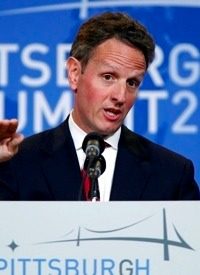
According to U.S. Treasury Secretary Timothy Geithner, the leaders of the G-20 nations now assembled in Pittsburgh are close to agreement on a set of international limits to be imposed on bonus compensation for bank executives. According to Geithner, limits on executive compensation for bankers allegedly responsible for the global financial meltdown will be in place by year’s end, and will be enforced by the Financial Stability Board, an international group of central bankers and regulators.
This modest first step, likely to be ignored by a public at large eager to see bankers get what’s coming to them, is in all probability an entering wedge that will lead to more and more regulation and control of banking and finance by an international authority or authorities.
But the primary blame for the financial meltdown does not reside with commercial bankers, private investment firms like hedge funds, and real estate speculators; it rests with central bankers and their allies in government — the very individuals who are now being asked to oversee and control the activities of the private banking and financial sector. For it is central banks, in collusion with parliaments and government treasuries, that set interest rates, control the supply of money, and create the cycle of boom and bust. Private bankers and financiers are certainly willing accomplices in many cases. But they are not the originators of the flawed policies that lead to the panics, recessions, and depressions that inevitably follow booms fueled by easy credit.
Another Obama Administration priority for this summit is to agree to phase out government subsidies for fossil fuels. On the one hand, taxpayer subsidies of the energy sector certainly are an affront to the notion of limited, laissez-faire government, but it is important to bear in mind that Obama merely envisages persuading the G-20 to end subsidies for the most efficient sources of energy — coal, oil, and natural gas — and to substitute for them government subsidies of supposedly greener sources of energy like wind and solar power. The option of allowing the private sector and the free markets to determine energy prices and availability is not, of course, to be considered (Had it ever been, we would have seen a surge in nuclear power plant construction decades ago).
All in all, it appears that the G-20 summit in Pittsburgh is likely to produce a welter of new proposals for international interference in the global economy. With the threat of an all-out global collapse apparently receding, however, the perceived urgency of so-called “international reforms” appears to be fading. Stay tuned.
Photo of Timothy Geithner: AP Images



